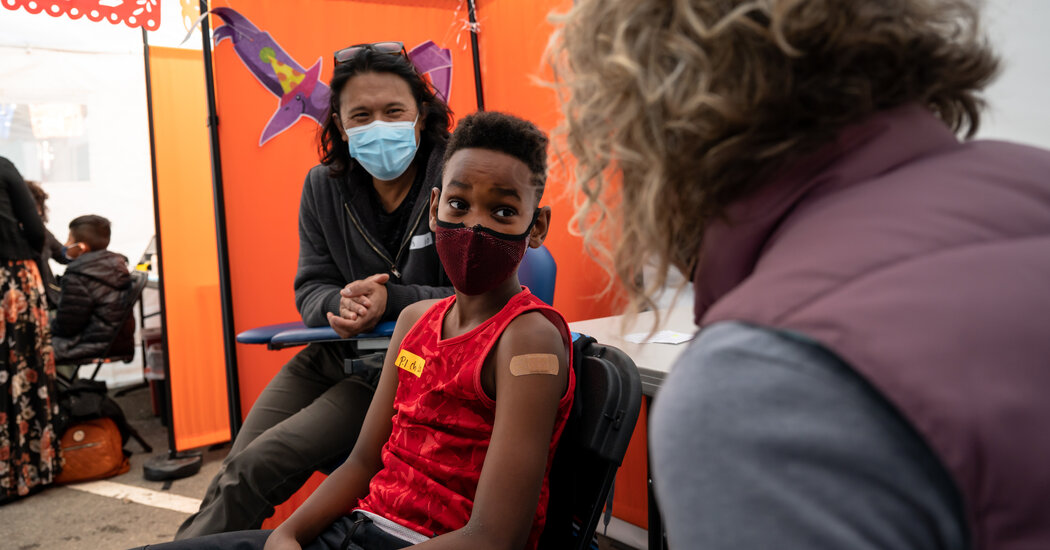A corporate announcement on Thursday that a small clinical trial showed a booster shot of the Pfizer-BioNTech coronavirus vaccine strengthened the imm
A corporate announcement on Thursday that a small clinical trial showed a booster shot of the Pfizer-BioNTech coronavirus vaccine strengthened the immune response of 140 children aged 5 to 11 comes as new U.S. virus cases are again ticking up. The upswing has been particularly noticeable in the Northeast, where the Omicron subvariant known as BA.2, now the dominant version of the virus in the United States, first took hold.
Dr. Anthony S. Fauci, President Biden’s chief medical adviser, warned in recent days that the United States could see a significant increase in infections over the next several weeks. But he has said the rates of hospitalizations are unlikely to rise in tandem because so many Americans have a degree of immunity, either from vaccines or prior infections.
Several hundred children age 5 to 11 have died of Covid since the pandemic began, according to the Centers for Disease Control and Prevention, but pediatric shots have been a hard sell for many parents. Only about 28 percent of children in that age group have received two doses and would be eligible for a booster. Roughly 7 percent have received just one dose, according to agency data.
There was an initial rush for shots after they were first offered for that age group in November, but the increase in the vaccination rate then slowed to a crawl. In the past month, for example, it rose by a single percentage point.
Dr. Kathryn M. Edwards, a pediatric vaccine expert at Vanderbilt University School of Medicine, said some parents feel that the chances are low that their children will get seriously ill, while the shots are an unknown. She said some research indicates that 45 percent of children who get infected have no symptoms.
“The problem is that we can’t predict who is going to get sick and who is not,” she said. And among those who do, she said, “there will be kids that are going to be hospitalized, and there will be a few deaths.”
Dr. Sally Goza, a Fayetteville, Ga., pediatrician and former president of the American Academy of Pediatrics, said some parents see no reason to act because they view the pandemic as quelled. “I’ve had parents come into my office and say, ‘Covid’s over. I don’t need to worry about that,’” she said.
To some extent, she said, parents have also been numbed by surge after surge of infection. “People are tired of dealing with it. They are just like, ‘We are just going to take our chances,’” she said.
The share of children age 5 to 11 with at least one dose varies starkly by region, according to a Kaiser Family Foundation study. Five of the top 10 states with the highest rates were in New England, while eight out of the 10 states with the lowest rates were in the South.
Even though more than 250 million Americans have been safely vaccinated since the pandemic began, pediatric experts say many parents fear unknown consequences for their children. Compared with shots to protect against measles, mumps and other diseases, which have been around for decades, the Covid vaccines are brand-new.
A study done by New York researchers, posted online in late February, found that for children age 5 to 11, the Pfizer vaccine’s effectiveness against infection fell to 12 percent from 68 percent within 28 to 34 days after the second dose.
That was a steeper decline than for older adolescents and teens who received a much stronger dose. Some experts suggested that the difference in dosage explained the gap in protection, while others blamed the Omicron variant that was prevalent during the study.
Another C.D.C. study stated that two Pfizer doses reduced the risk of Omicron infection by 31 percent among those ages 5 to 11, compared with a 59 percent reduction in risk among those ages 12 to 15.
Pfizer’s vaccine is so far the only one authorized for those younger than 18.
www.nytimes.com
